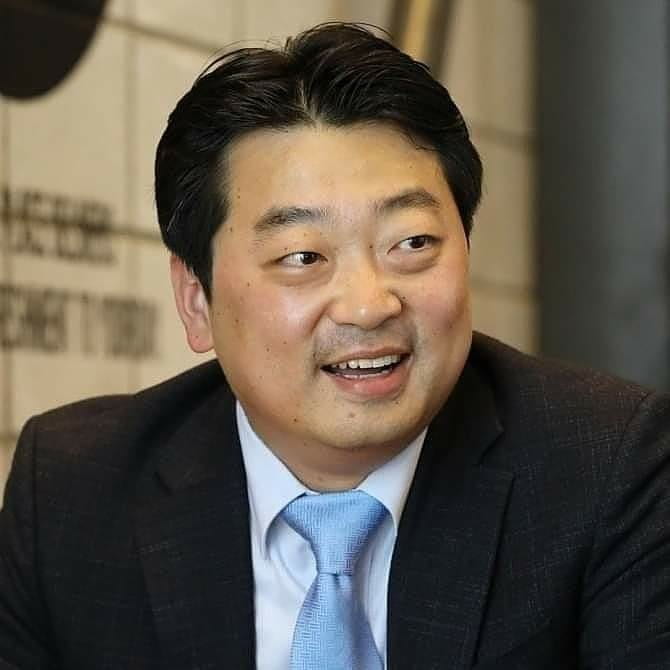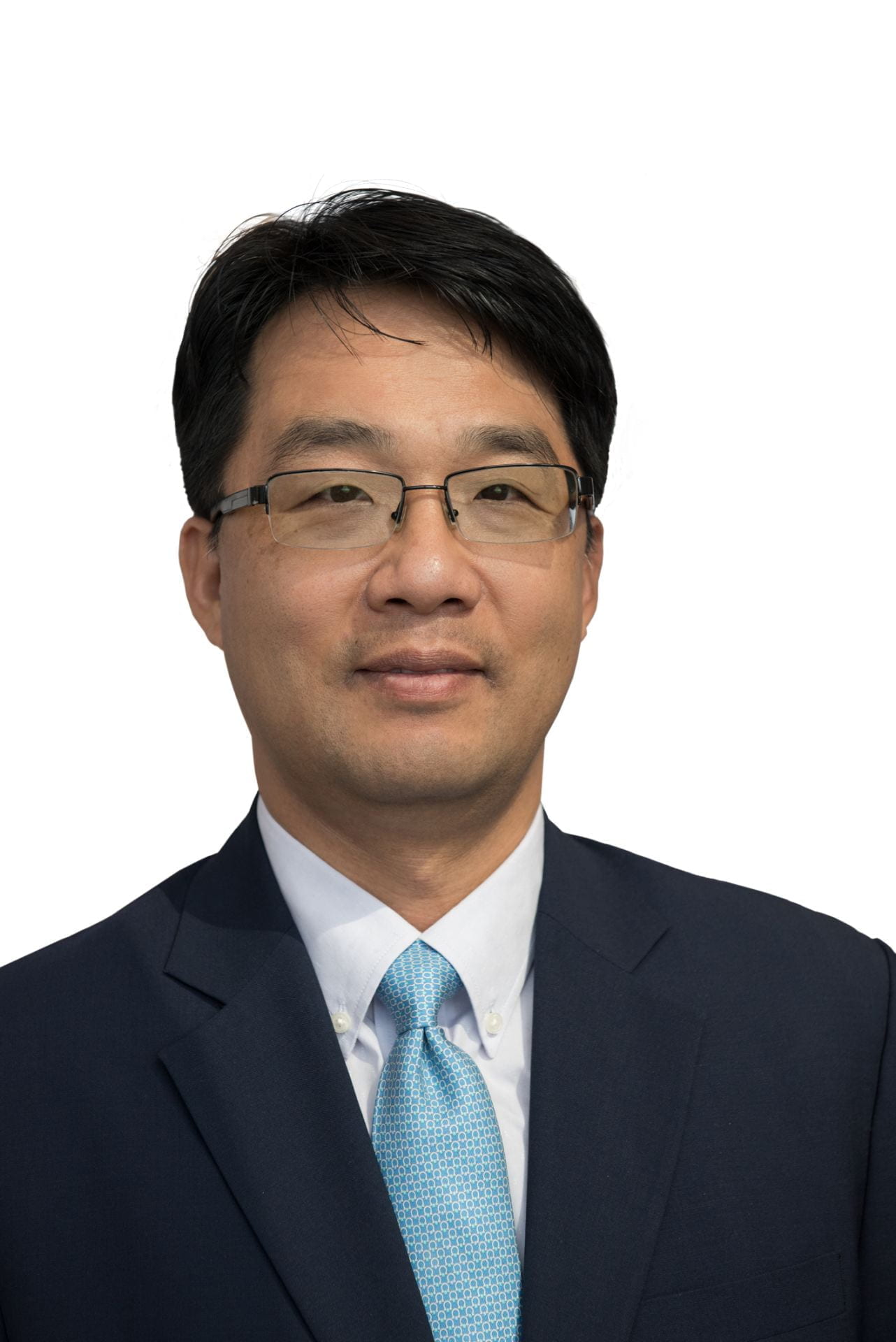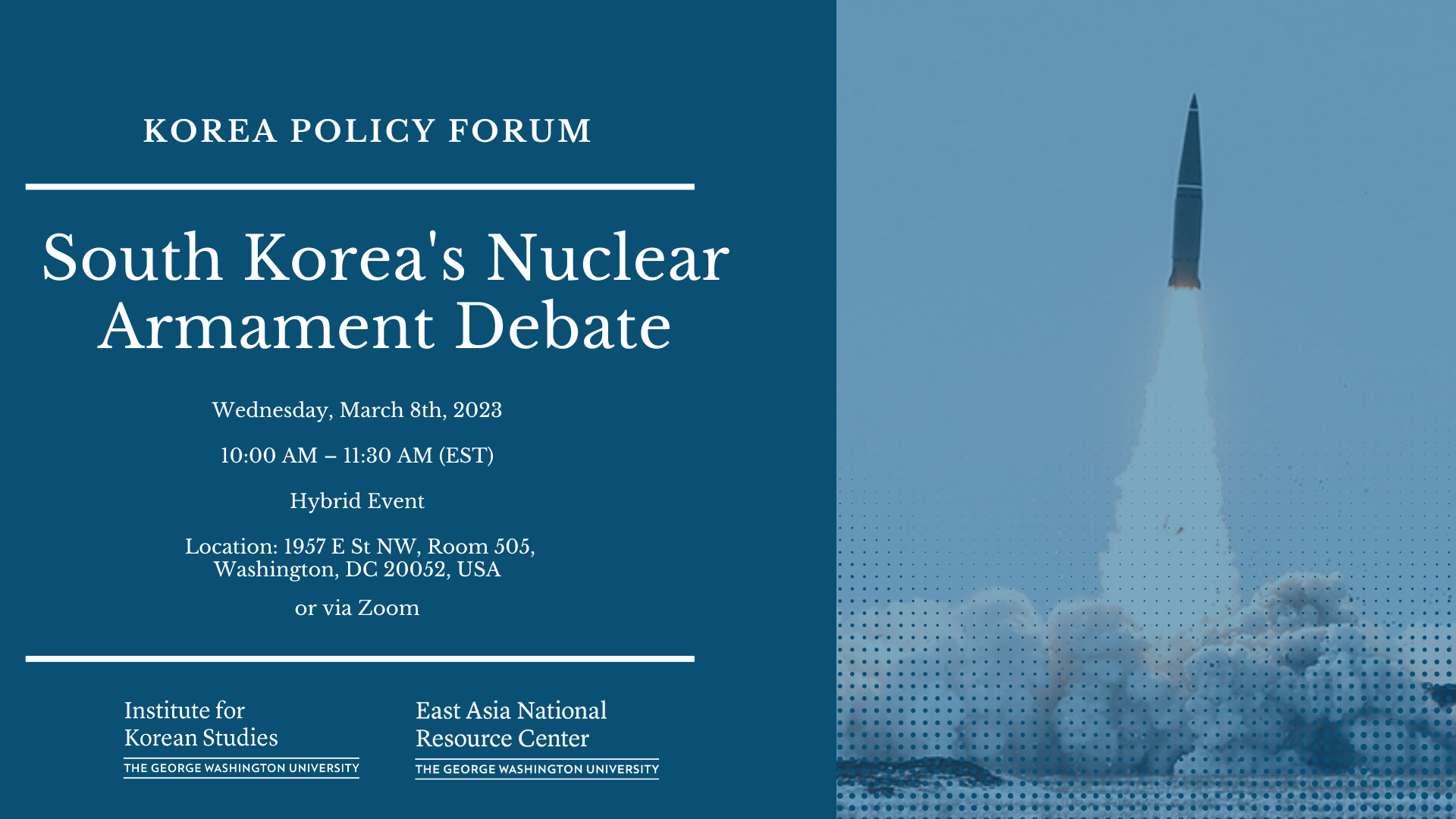Korea Policy Forum
South Korea’s Nuclear Armament Debate
Wednesday, March 8, 2023
10:00 AM – 11:30 AM EDT
Hybrid Event
Elliott School of International Affairs, George Washington University (Room 505)
1957 E Street Northwest Room 505 Washington, DC 20052
Virtual via Zoom
North Korea’s recent advanced missile tests and hostile statements that include threats of preemptive nuclear attacks against South Korea have fueled a debate among South Koreans about new military options to address the growing threat from the North. One noticeable development is that South Korea’s nuclear armament, a topic that used to be a taboo for decades, is increasingly drawing attention as an option that should be on the table. One could dismiss this as a tide of “nuclear populism” that could be subdued by reassuring and strengthening U.S. extended deterrence against the North Korean threat. However, it is also true that this traditionally unthinkable option is being seriously examined by more politicians and experts in South Korea than in the past. Two leading experts from the U.S. and South Korea, respectively, will be joining us to discuss their views of South Korea’s nuclear armament debate. The GW Institute for Korean Studies and the East Asia National Resource Center invite you to join us for an engaging discussion on this important topic.
Speakers

Young-Jun Kim is a Professor of the National Security College at the Korea National Defense University (KNDU) and a visiting scholar of the Elliott School of International Affairs of the George Washington University. He has served as a member of Central Committee of the Presidential Peaceful Unification Advisory Board, a member of National Security Advisory Board for the Republic of Korea President’s Office, a member of advisory board for the Department of Unification, the National Assembly, the Ministry of Foreign Affairs, Ministry of National Defense, the Joint Chief of Staff and the National Intelligence Service. His recent publications include Origins of the North Korean Garrison State: People’s Army and the Korean War (2017). He is a member of the ROK-U.S. Combined Forces Commander’s Strategic Shaping Board (CSSB) and the former International Senior Research Fellow at the U.S. Army’s Foreign Military Studies Office (FMSO) at Fort Leavenworth. He is a managing editor of journal “The Korean Journal of Nuclear Nonproliferation and Energy” sponsored by the Ministry of Foreign Affairs and the General-Director for the Korea Nuclear Policy Society and Korea Defense Policy Association. As Korean security expert, he has appeared on the FOX TV News, CBS TV News, BBC TV News, the Wall Street Journal, the National Interest, WION News TV, Al Zazeera New TV, Kyodo Tongshin and other Korean and international media.

Sang-Hyun Lee is the President of the Sejong Institute in Korea. He also serves as President of the Korea Nuclear Policy Society (KNPS). He was a research fellow at the Korean Institute for International Studies (1987-88), the Korea Institute for Defense Analysis (1988-90), and a policy advisor for the Ministry of Foreign Affairs, the Ministry of National Unification, and the Ministry of National Defense. He served as Director-General for Policy Planning, Ministry of Foreign Affairs (MOFA) from May 2011 to April 2013. He is a member of the Asia-Pacific Leadership Network (APLN) for Nuclear Nonproliferation and Disarmament and the Korea-US Nuclear Policy Leadership Initiative (NPLI). He was a visiting scholar at the Institute for
Development and Security (ISDP) in Stockholm, Sweden and the Stimson Center in Washington DC. His main research interests include international politics and security, Korea-U.S. relations, inter-Korean relations, nuclear security and nonproliferation, and East Asian security issues. His recent publications include: Trump Administration’s Nuclear Policy: Implications for Global Nuclear Energy and North Korean Nuclear Issue (2019), Trump Administration’s National Security Policy and Its Implications for Global Order and Korean Peninsula (2018), Trump Administration and ROK-US Relations (2017, co-authored), and North Korea under Kim Jong-un: Evaluating Past Five Years (2017, co-authored). He received his B.A. and M.A. from Seoul National University and Ph.D. from the Department of Political Science at the University of Illinois at Urbana-Champaign in 1999.

Ankit Panda is the Stanton Senior Fellow in the Nuclear Policy Program at the Carnegie Endowment for International Peace. An expert on the Asia-Pacific region, his research interests range nuclear strategy, arms control, missile defense, nonproliferation, emerging technologies, and U.S. extended deterrence. He is the author of Kim Jong Un and the Bomb: Survival and Deterrence in North Korea (Hurst Publishers/Oxford University Press, 2020). Panda was previously an adjunct senior fellow in the Defense Posture Project at the Federation of American Scientists (FAS) and a member of the 2019 FAS International Study Group on North Korea Policy. He has consulted for the United Nations in New York and Geneva on nonproliferation and disarmament matters, and has testified on security topics before the U.S.Senate Armed Services Committee and the congressionally chartered U.S.-China Economic and Security Review Commission. Panda was a Korea Society Kim Koo Fellow, a German Marshall Fund Young Strategist, an International Institute for Strategic Studies (IISS) Shangri-La Dialogue Young Leader, and a Carnegie Council on Ethics in International Affairs New Leader. He has worked at the Council on Foreign Relations and the Liechtenstein Institute on Self-Determination at the Princeton School of Public and International Affairs.

Jenny Town is a Senior Fellow at the Stimson Center and the Director of Stimson’s 38 North Program. Her expertise is in NorthKorea,U.S.-DPRK relations, the U.S.-ROK alliance and Northeast Asian regional security. She was named one of Worth Magazine’s “Groundbreakers 2020: 50 Women Changing the World” and one of Fast Company’s Most Creative People in Business in 2019 for her role in co- founding and managing the 38 North website, which provides policy and technical analysis on North Korea. Ms. Town is also an expert reviewer for Freedom House’s Freedom in the World Index, where she previously worked on the Human Rights in North Korea Project; an Associate Fellow at the Foreign Policy Institute at Johns Hopkins School of Advanced International Studies (SAIS), a Member of the National Committee on North Korea, and an Associate Member of the Council of Korean Americans. She serves on the Editorial Board for Inkstick, an online foreign policy journal for emerging scholars. From 2008- 2018, Ms. Town served as the Assistant Director of the U.S.-Korea Institute at SAIS. She holds a BA in East Asian Studies and International Relations from Westmar University and a Master of International Affairs from Columbia University School of International and Public Affairs.
Moderator

Yonho Kim is an Associate Research Professor of Practice and the Associate Director of GW Institute for Korean Studies. He specializes in North Korea’s mobile telecommunications and U.S. policy towards North Korea. Kim is the author of North Korean Phone Money: Airtime Transfers as a Precursor to Mobile Payment System (2020), North Korea’s Mobile Telecommunications and Private Transportation Services in the Kim Jong-un Era (2019) and Cell Phones in North Korea: Has North Korea Entered the Telecommunications Revolution? (2014). His research findings were covered by various media outlets, including Wall Street Journal, The Atlantic, Yonhap News, and Libération. Prior to joining GWIKS, he extensively interacted with the Washington policy circle on the Korean peninsula as Senior Researcher of the U.S.-Korea Institute at Johns Hopkins University School of Advanced International Studies, Senior Reporter for Voice of America’s Korean Service, and Assistant Director of the Atlantic Council’s Program on Korea in Transition. He holds a B.A. and M.A. in International Relations from Seoul National University, and an M.A. in International Relations and International Economics from Johns Hopkins University School of Advanced International Studies.

